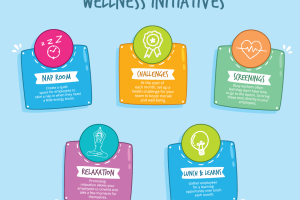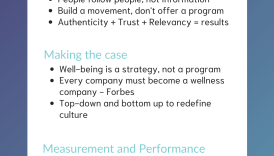The Ultimate Guide to Wellness: Tips from a Healthy Life Company

About the Healthy Life Company
In today’s fast-paced world, the quest for wellness is more critical than ever, and that’s where the Healthy Life Company comes in. Founded with a mission to empower individuals to take charge of their health, this company specializes in providing resources, information, and holistic approaches to strengthen both physical and mental well-being. What sets the Healthy Life Company apart is its emphasis on a balanced lifestyle, offering a variety of tools ranging from exercise programs, nutrition guides, and mental wellness workshops, to community support initiatives. Through their online platform and local workshops, the company creates a nurturing environment where individuals can learn about healthy living while connecting with like-minded individuals. Picture a supportive community where tips on meal prepping are shared alongside stories of personal transformation—this is the essence of the Healthy Life Company.
- The Ultimate Guide to Wellness: Tips from a Healthy Life Company
- About the Healthy Life Company
- Why Wellness is Important
- Physical Wellness
- Exercise Routines
- Nutrition Tips
- Mental Wellness
- Stress Management Techniques
- Importance of Self-Care
- Emotional Wellness
- Building Healthy Relationships
- Coping Strategies for Negative Emotions
- Holistic Wellness
- Mind-Body Connection
- Practices for Spiritual Growth
Why Wellness is Important
Wellness encompasses more than just the absence of illness; it’s about thriving in every aspect of life. Prioritizing wellness can lead to improved quality of life, increased productivity, and a more fulfilling existence. Consider the following points:
- Physical Benefits: Engaging in regular exercise and maintaining a nutritious diet can lower the risk of chronic diseases, enhance energy levels, and promote longevity.
- Mental Clarity: Addressing mental health through proper stress management techniques fosters clearer thinking and improves decision-making skills.
- Emotional Stability: Practicing self-care and nurturing relationships helps individuals navigate through life’s challenges with resilience.
Embracing a holistic approach to wellness can create ripples of positive change. For example, someone who incorporates daily meditation into their routine may find that it not only calms their mind but also enhances their relationships by fostering patience and understanding. In summary, the Healthy Life Company inspires individuals to adopt a lifestyle that values wellness in conjunction with physical, mental, and emotional health—a journey worth embarking on for anyone seeking to live life to the fullest.
Physical Wellness
Exercise Routines
Transitioning to physical wellness, it’s essential to recognize that regular exercise plays a pivotal role in enhancing our overall health. Establishing a consistent exercise routine doesn’t have to be overwhelming; it can be simple and enjoyable. From personal experience, starting small can make a significant difference. For instance, a friend of mine began with just a 15-minute walk each day, which gradually evolved into half-hour jogs and eventually inspired her to join a local running club. When creating an exercise routine, consider the following tips:
- Variety is Key: Incorporate different types of workouts to keep things interesting. A balanced routine may include:
- Cardiovascular exercises (like jogging, swimming, or cycling)
- Strength training (using weights or bodyweight exercises)
- Flexibility and balance workouts (such as yoga or Pilates)
- Find What You Love: This could be dancing, hiking, or even playing a sport—whatever motivates you to move!
- Set Realistic Goals: Start with achievable objectives, like walking 10,000 steps a day, and gradually increase as you gain strength and endurance.
Nutrition Tips
Just as exercise is vital for physical wellness, a well-rounded diet helps fuel our bodies for success. Healthy nutrition can seem daunting, but small incremental changes can lead to big outcomes. For example, one small adjustment my sister made was swapping out sugary snacks for fruits or nuts, which not only improved her energy levels but also made her feel better overall. Here are some practical nutrition tips to improve your eating habits:
- Prioritize Whole Foods: Aim to fill your plate with:
- Fresh fruits and vegetables
- Whole grains
- Lean proteins (like chicken, fish, or legumes)
- Stay Hydrated: Drink plenty of water throughout the day, aiming for about 8 cups or more depending on your activity level.
- Mindful Eating: Slow down and savor your food. This can prevent overeating and help you listen to your body’s hunger cues.
In summary, promoting physical wellness through regular exercise and balanced nutrition is fundamental to feeling your best. Making these lifestyle changes can lead to remarkable improvements in energy, mood, and overall health—setting the stage for even deeper explorations of mental and emotional wellness.
Mental Wellness
Stress Management Techniques
As we navigate through life, it’s inevitable that we will encounter stressors that can affect our mental wellness. Transitioning from physical wellness to mental wellness highlights the necessity of effective stress management techniques to maintain a balanced life. Reflecting on my own experiences, I often found that simple techniques, when practiced consistently, can make a significant difference. Here are some stress management strategies that anyone can incorporate into their daily routine:
- Deep Breathing Exercises: Taking a few moments to focus on your breath can be transformative. When feeling overwhelmed, try inhaling deeply for four counts, holding for four, and exhaling for six. Repeating this for a few minutes can calm the mind.
- Mindfulness Meditation: Practicing mindfulness helps anchor you in the present moment. Even starting with just five minutes of guided meditation each day can enhance clarity and reduce anxiety.
- Physical Activity: Whether it’s a brisk walk, yoga, or strength training, physical movement is a natural stress-reliever. My cousin, for instance, found solace in nightly yoga sessions, which grounded her and improved her sleep.
- Set Boundaries: Learn to say no when necessary. Overcommitting can lead to stress accumulation, so ensure to prioritize commitments and make time for yourself.
Importance of Self-Care
Transitioning into self-care, it’s essential to recognize that prioritizing your mental wellness requires intentional acts of self-love. Self-care is not a luxury; it’s a necessity that enhances our overall well-being. After a period of neglecting my own self-care in favor of work obligations, I realized that time spent indulging in activities I love—such as reading or painting—significantly improved my mood and productivity levels. Here are some self-care practices to consider:
- Create Time for Hobbies: Engage in activities you genuinely enjoy, whether it’s gardening, cooking, or crafting.
- Establish a Routine: Maintaining a structured schedule can provide a sense of stability. Schedule regular breaks during your day for relaxation.
- Limit Screen Time: Reducing time spent on screens, especially before bed, can lead to improved mental clarity and better sleep.
- Connect with Loved Ones: Nurturing relationships is vital. Regularly reaching out to friends and family can provide emotional support and strengthen connections.
In summary, integrating stress management techniques and prioritizing self-care into daily life is crucial for maintaining mental wellness. As individuals foster a balanced mind, they will find themselves better equipped to face life’s challenges, emphasizing the importance of nurturing both body and mind.
Emotional Wellness
Building Healthy Relationships
Transitioning from mental wellness to emotional wellness emphasizes the profound impact that healthy relationships have on our overall well-being. Emotional wellness is deeply intertwined with how we connect with others; after all, we are social beings. For instance, I vividly recall a period when I was feeling overwhelmed and isolated. It was reaching out to close friends for support that made all the difference. Not only did their understanding provide comfort, but it also reminded me of the importance of nurturing relationships. Here are some key points to consider when building healthy relationships:
- Authenticity Matters: Be your true self. When you express genuine thoughts and feelings, it fosters deeper connections.
- Effective Communication: Open and honest communication is vital. Listen actively and be receptive to feedback. My friend always says, “A conversation is like a dance; it requires both partners to be engaged.”
- Establish Boundaries: Healthy relationships require clear boundaries. Know your limits and don’t hesitate to communicate them to others.
- Invest Time: Quality time trumps quantity. Regularly dedicate time to reconnect with loved ones, whether through coffee dates or phone calls.
Coping Strategies for Negative Emotions
After strengthening our relationships, it’s crucial to address how we cope with negative emotions. Everyone experiences these feelings at some point, but how we deal with them can significantly affect our emotional wellness. Reflecting on my own life, I’ve learned that allowing space for these emotions can lead to personal growth. Here are some effective coping strategies for negative emotions:
- Journaling: Write down your thoughts and feelings. This practice can clarify your emotions and provide relief. I started journaling during stressful times, and it helped me identify patterns in my feelings.
- Engage in Creative Outlets: Channel negative emotions into creative experiences. Whether it’s art, music, or another form of expression, creativity can serve as a powerful release.
- Practice Gratitude: Even in challenging times, focusing on what you’re thankful for can shift your mindset. Keep a gratitude journal to remind yourself of the positive aspects of your life.
- Seek Professional Help: Sometimes, talking to a therapist can provide additional tools for coping and understanding emotions more deeply. There’s no shame in asking for support.
In conclusion, nurturing emotional wellness involves building healthy relationships and developing effective coping strategies. As individuals embrace these practices, they not only enhance their emotional resilience but also create a more fulfilling and connected life.
Holistic Wellness
Mind-Body Connection
Continuing our journey toward holistic wellness, it’s essential to delve into the powerful mind-body connection. This concept underscores how our emotions, thoughts, and mental state can influence our physical well-being, and vice versa. For example, during a particularly stressful period at work, I found myself experiencing frequent headaches. However, once I began practicing mindfulness and relaxation techniques, my physical symptoms noticeably improved. Here are a few strategies to strengthen your mind-body connection:
- Mindfulness Meditation: Engaging in mindfulness meditation can help you tune in to your body’s sensations and emotions, promoting relaxation and awareness.
- Yoga: Combining physical movement with breath awareness, yoga serves as a potent tool to harmonize the mind and body. I’ve personally attended yoga classes that not only improved my flexibility but also brought immense mental clarity.
- Body Scan Technique: This involves mentally scanning your body for areas of tension and consciously relaxing them. This technique can enhance awareness of the connection between your body and emotions.
- Physical Activity: Regular exercise releases endorphins, elevating mood and reducing stress. Finding an activity that you enjoy makes it easier to stay committed.
Practices for Spiritual Growth
Transitioning into the realm of spiritual growth, it’s essential to recognize that spirituality can take many forms, ultimately enriching one’s sense of purpose and connection. Many people, including myself, have found that exploring spiritual practices can pave the way for deeper self-understanding and fulfillment. Here are some practices to foster your spiritual growth:
- Meditation and Reflection: Setting aside time for quiet reflection or guided meditation can enhance your spiritual awareness. During my own journey, meditating on my values helped me align my daily actions with my beliefs.
- Nature Connection: Spending time in nature can be a spiritual experience. Whether it’s hiking in the mountains or strolling through a park, nature invites introspection and a sense of peace.
- Reading Spiritual Texts: Exploring various philosophical or spiritual writings can open your mind to new perspectives. I often find solace and inspiration in reading works from different traditions.
- Community Engagement: Joining a community group that shares similar spiritual beliefs can foster a sense of belonging. Connecting with others on a spiritual level can deepen your personal journey.
In summary, embracing holistic wellness entails nurturing the mind-body connection and exploring practices for spiritual growth. By integrating these elements into daily life, individuals can achieve a more comprehensive sense of well-being, ultimately leading to a richer and more meaningful existence.





